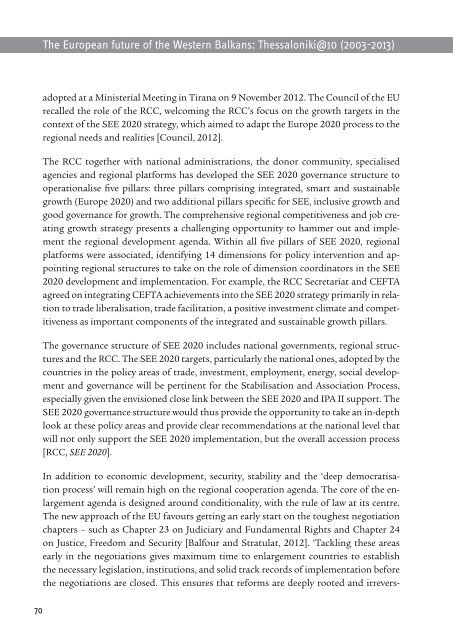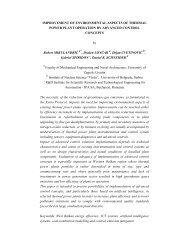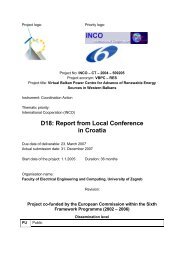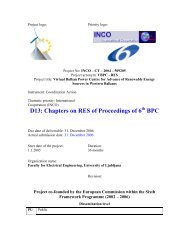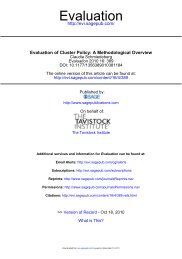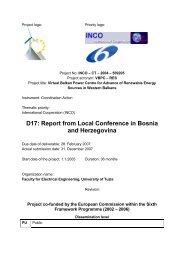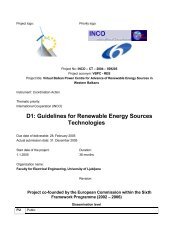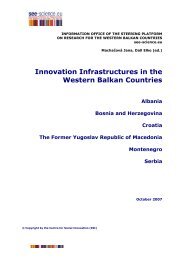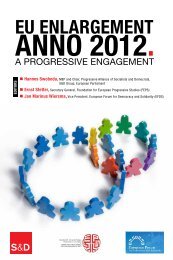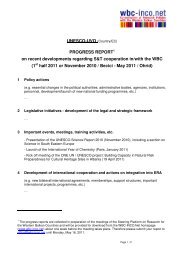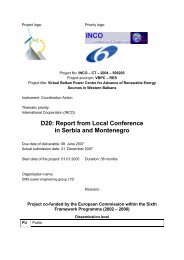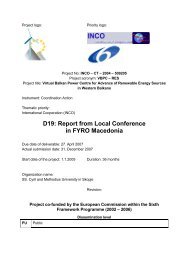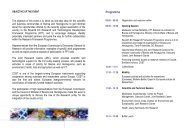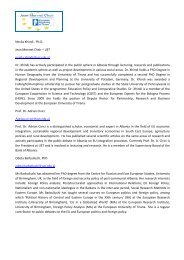The European future of the Western Balkans: Thessaloniki@10
The European future of the Western Balkans: Thessaloniki@10
The European future of the Western Balkans: Thessaloniki@10
Create successful ePaper yourself
Turn your PDF publications into a flip-book with our unique Google optimized e-Paper software.
70<br />
<strong>The</strong> <strong>European</strong> <strong>future</strong> <strong>of</strong> <strong>the</strong> <strong>Western</strong> <strong>Balkans</strong>: <strong>The</strong>ssaloniki@10 (2003-2013)<br />
adopted at a Ministerial Meeting in Tirana on 9 November 2012. <strong>The</strong> Council <strong>of</strong> <strong>the</strong> EU<br />
recalled <strong>the</strong> role <strong>of</strong> <strong>the</strong> RCC, welcoming <strong>the</strong> RCC’s focus on <strong>the</strong> growth targets in <strong>the</strong><br />
context <strong>of</strong> <strong>the</strong> SEE 2020 strategy, which aimed to adapt <strong>the</strong> Europe 2020 process to <strong>the</strong><br />
regional needs and realities [Council, 2012].<br />
<strong>The</strong> RCC toge<strong>the</strong>r with national administrations, <strong>the</strong> donor community, specialised<br />
agencies and regional platforms has developed <strong>the</strong> SEE 2020 governance structure to<br />
operationalise five pillars: three pillars comprising integrated, smart and sustainable<br />
growth (Europe 2020) and two additional pillars specific for SEE, inclusive growth and<br />
good governance for growth. <strong>The</strong> comprehensive regional competitiveness and job creating<br />
growth strategy presents a challenging opportunity to hammer out and implement<br />
<strong>the</strong> regional development agenda. Within all five pillars <strong>of</strong> SEE 2020, regional<br />
platforms were associated, identifying 14 dimensions for policy intervention and appointing<br />
regional structures to take on <strong>the</strong> role <strong>of</strong> dimension coordinators in <strong>the</strong> SEE<br />
2020 development and implementation. For example, <strong>the</strong> RCC Secretariat and CEFTA<br />
agreed on integrating CEFTA achievements into <strong>the</strong> SEE 2020 strategy primarily in relation<br />
to trade liberalisation, trade facilitation, a positive investment climate and competitiveness<br />
as important components <strong>of</strong> <strong>the</strong> integrated and sustainable growth pillars.<br />
<strong>The</strong> governance structure <strong>of</strong> SEE 2020 includes national governments, regional structures<br />
and <strong>the</strong> RCC. <strong>The</strong> SEE 2020 targets, particularly <strong>the</strong> national ones, adopted by <strong>the</strong><br />
countries in <strong>the</strong> policy areas <strong>of</strong> trade, investment, employment, energy, social development<br />
and governance will be pertinent for <strong>the</strong> Stabilisation and Association Process,<br />
especially given <strong>the</strong> envisioned close link between <strong>the</strong> SEE 2020 and IPA II support. <strong>The</strong><br />
SEE 2020 governance structure would thus provide <strong>the</strong> opportunity to take an in-depth<br />
look at <strong>the</strong>se policy areas and provide clear recommendations at <strong>the</strong> national level that<br />
will not only support <strong>the</strong> SEE 2020 implementation, but <strong>the</strong> overall accession process<br />
[RCC, SEE 2020].<br />
In addition to economic development, security, stability and <strong>the</strong> ‘deep democratisation<br />
process’ will remain high on <strong>the</strong> regional cooperation agenda. <strong>The</strong> core <strong>of</strong> <strong>the</strong> enlargement<br />
agenda is designed around conditionality, with <strong>the</strong> rule <strong>of</strong> law at its centre.<br />
<strong>The</strong> new approach <strong>of</strong> <strong>the</strong> EU favours getting an early start on <strong>the</strong> toughest negotiation<br />
chapters – such as Chapter 23 on Judiciary and Fundamental Rights and Chapter 24<br />
on Justice, Freedom and Security [Balfour and Stratulat, 2012]. ‘Tackling <strong>the</strong>se areas<br />
early in <strong>the</strong> negotiations gives maximum time to enlargement countries to establish<br />
<strong>the</strong> necessary legislation, institutions, and solid track records <strong>of</strong> implementation before<br />
<strong>the</strong> negotiations are closed. This ensures that reforms are deeply rooted and irrevers-


